Every once in awhile there are moments in film where we are privy to real movie magic. Not the magic of technology, but the magic where the stars align and someone is so perfectly cast in a role that it feels like divine intervention was at play, especially once you see the performance. And then when you add a writer/director so attuned to the emotional resonance of the story that it feels as if the camera has wings, capturing every emotional heartbeat and nuance, so powerful that it’s as if the emotion is flying off the screen and into the beating hearts of the audience, that’s real magic. That actor is Cliff Curtis as Genesis Potini. That writer/director is James Napier Robertson. That film is THE DARK HORSE.

Genesis “Gen” Potini is the most unlikely of heroes, yet he has touched more lives with positivity and inspiration than most of us will ever fathom. Known as “The Dark Horse”, in his youth Gen was a New Zealand speed-chess champion. He was unbeatable. But then bipolar mental illness took hold of him and he was institutionalized. In and out of hospitals, he was unable to control his bipolar swings. Over his lifetime, there would be years where he lived on the streets or underneath a bridge. Other times, he would go for long stretches with bouts of depression, unable to get out of bed. But THE DARK HORSE isn’t about the dark times, it’s about the light of Genesis Potini, a light that still shines bright today.
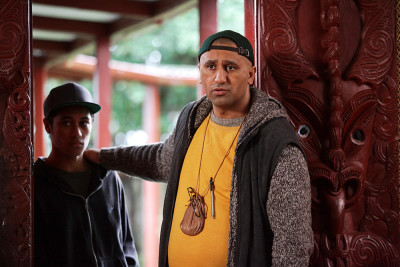
We first meet Gen as he walks about the main street in the little community where he lives. Although in New Zealand, it could be Main Street in Anytown, U.S.A. Of Maori descent, Gen is a big man, an imposing man. Missing teeth and with a shaved head, he is an oddity most people shy away from, yet on second glance, there is frailty to this gentle giant. Sometimes seeming a little bit slow, Gen is anything but. A spiritual man, he philosophizes about life and when focused, can orate with the best of them. He has keen head for strategy and mathematics and, of course, chess. Locals know him and know of his mental illness. They see him as harmless. Outsiders, not so much. Wearing his brightly colored Crocs, baggy clothes and wrapped in a multi-colored patchwork quilt, you can’t help but be drawn to him. Who is this man? As a cloudburst opens from the heavens, rather than run from the rain, Gen embraces it, opening his arms welcoming the blessings from above. But something catches his eye across the street. Walking into the local mercantile, Gen sees a chess set and proceeds to play against himself in a speed-chess match. The shopkeeper is mesmerized, as are we sitting in a darkened theatre. But then his mania sets in and he is whisked away back to the hospital.
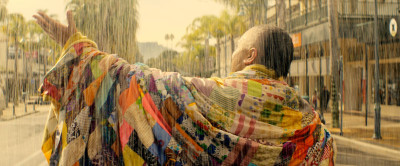
Ultimately released from another hospital and placed in the care of his brother, Ariki, Gen is at a loss on how to exist in Ariki’s world. Long estranged, Ariki is now part of a violent gang life. Gen wants no part of that, but the condition of his release is that he stay with Ariki and Ariki is to make sure Gen takes his meds and stays “in control.”
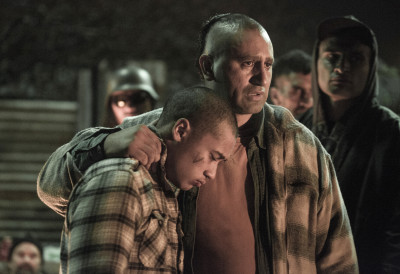
Uncomfortable with his situation with Ariki, Gen gets an idea and in the middle of the night heads off to see his long time friend and former chess partner, Noble. Noble runs a local youth group chess club – the Eastern Knights – for the disadvantaged kids in the community. A low income community and with gang violence and influence abounding, it’s a safe haven for many. Gen wants to help Noble. But not just “help”, he wants to coach the kids in chess with an eye towards the National Chess Championships. Noble is more than dubious at allowing Gen, himself troubled and subject to manic mood swings at any moment, to work with these kids. Ultimately, Gen’s sincerity and persistence win Noble over. Kicked out of Ariki’s house, any money that Noble has, he spends on new chess sets for the kids instead of putting a roof over his own head.
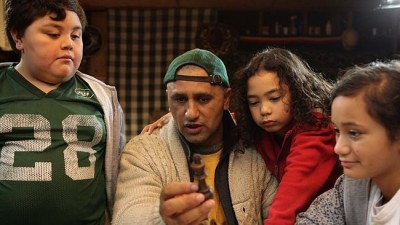
His dedication is infectious as is his teaching style with the kids, all whom grow to adore him. Using the chess pieces as characters in Maori lore he not only gives the kids a sense of their history, but family, as he explains the folklore in terms of the relationships and movements of chessmen. As much as Gen is the force that inspires hope in these kids, they are Gen’s driving force to stay on his meds and sleep schedule. Already Gen’s efforts with the children are coming back to him tenfold. The kindness of others leads to a temporary roof over Gen’s head and a van to drive.
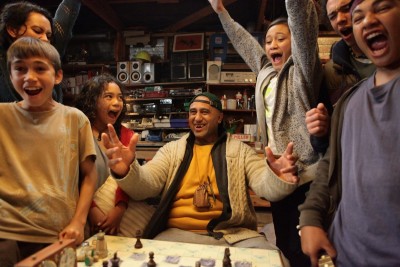
One real source of pride for Gen in this venture is his nephew Mana who has an aptitude for chess and wants to escape the gang life his father is forcing him into. But that bond presents its own set of problems as Ariki squares off against Gen over Mana’s future and threatens the newfound stability and purpose in Gen’s life as the Eastern Knights fight their way to Auckland and the championships.
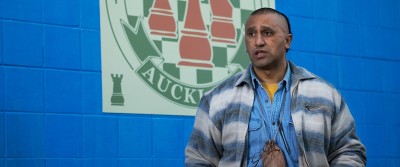
Cliff Curtis. There are no words adequate to describe his performance as Genesis Potini. There is an purity and authenticity to his performance that transcends that of an actor assuming a role. It is impossible to tell where Curtis ends and Genesis begins. A tour de force performance for the ages. During my exclusive interview with Cliff Curtis, it was surprising to learn he originally didn’t think he was right for the role. “I was really intimidated by the role. I didn’t really understand how you could convey mental illness or the physicality of the guy who was so different from me. . .There were so many things to the equation.” Credit writer/director Robertson who suggested Curtis “go method”, something Curtis had never done. “I’m a working actor. I kind of like turn up, show me the lines and I hit the marks and I’ll be professional, but living in the character for months at a time? I don’t even know how that was possible.”
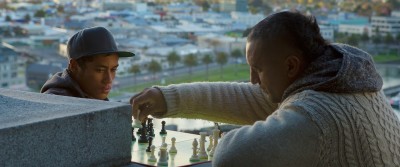
Electing to approach Genesis not from his physical appearance, but emotionally and intellectually, “I wanted to really understand who the man was and not be concerned about the superficial aspects; the fact he had no teeth, that he was massively huge, or his hairstyle or what he wore. I just wanted to understand how it was that he affected the people the way that he did, and how he helped people, and he overcame his obstacles in life. I thought the most important thing for the story was to somehow inspire and uplift people, and to show the love and compassion that he was able to convey through the way he lived his life.” Notable is that Curtis achieves that and more as there is not a moment on screen where one does not feel hope emanating from the character. Through manic high and lows, Curtis found the soul of Genesis and shares that with us. Resonant are Genesis’ tacit life lessons which he equates to the game of chess.
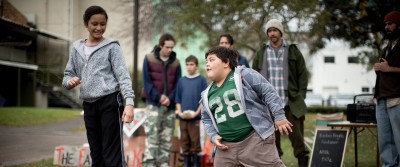
The chemistry between Cliff Curtis and his young co-stars is undeniable. And talk about fun and engaging! This cast of kids ranks as one of the best on screen. There is a great affection among them that is both visible and visibly felt, particularly between Curtis and James Rolleston. Having worked with Rolleston on an earlier film Curtis produced called “Boy”, it was Curtis who fought for Rolleston as Mana. The relationship arc that develops on screen between Curtis and Rolleston as Genesis and Mana has an almost protective nature about it. And while this film focuses on Genesis, director Robertson wisely knows that it’s the relationships that develop which are the heart of Genesis and the story, thus allowing a day in the sun for many of the kids in the film, particularly Rolleston. In establishing this new and different relationship between himself and Rolleston, Curtis notes, “We got to play a lot of chess together. We got reunited. But he got to meet me not as Cliff, but as Genesis; which was fun for me, but weird for him, I think. We got to hang out a lot. . . There was just a very natural, very organic relationship.”
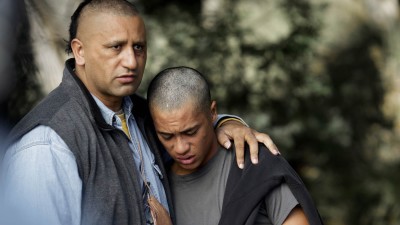
As Noble, Kirk Torrance provides a stable grounding to the film, and to a degree, Genesis. Standout is Wayne Hapi who is an imposing, frightening presence as Ariki.
Writer/director James Napier Robertson first learned of Genesis Potini when he saw Jim Marbrook’s award-winning 2003 documentary on the man. Knowing he had to tell Genesis’ story in a narrative, he reached out to Genesis and over the course of hundreds of hours of conversations and thousands of chess games, an unbreakable bond and trust was formed. It’s that personal connection that Robertson infuses into every fabric of the script, and in the verite-styling lensing that lets us see the world through Genesis’ eyes and heart. Thanks to the 360 degree hand-held camera work of cinematographer Denson Baker, and the “method” approach taken by both Robertson and Curtis with Genesis, we are constantly “in the moment”, living and feeling Genesis and his emotions. There is an intimacy forged that allows the audience to see the world as Genesis views it; he is our eyes. That tone, that connection, is established with the opening scene as Baker and his camera follow in Genesis’ footsteps out into the street, welcoming the rain and that first sighting of a chess set. The visual grammar is beautifully constructed. A permeating unpredictability of Genesis’ behavior due to his illness then adds a palpable edginess and raw truth to THE DARK HORSE, that is enhanced by the hand-held lensing and Peter Roberts editing.
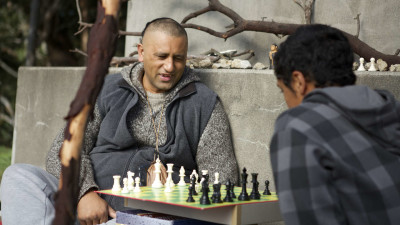
As Cliff Curtis reflects, “[Genesis] gave himself a purpose to give hope, to bring hope into [the kids] lives and to bring hope into his own life. I think it’s a very beautiful moving story and it’s a privilege to focus on this very tiny story.” A tiny story that comes from the very big heart of THE DARK HORSE.
Written and Directed by James Napier Robertson
Cast: Cliff Curtis, James Rolleston, Kirk Torrance, Wayne Hapi












